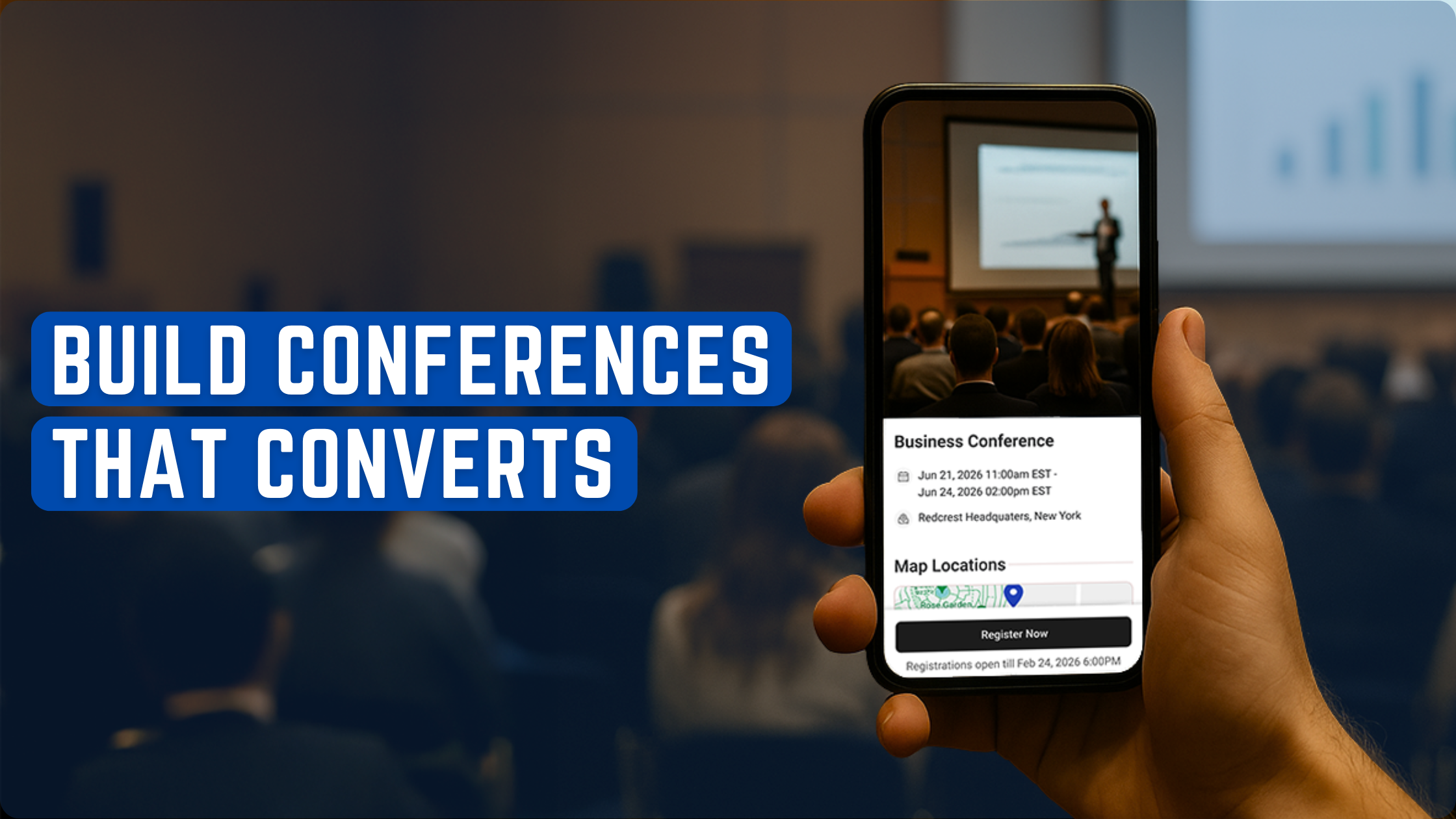If you’re wondering how to be a successful event manager in 2024, you came to the right place. Growing into a successful event manager isn’t as complex as it sounds. In fact, it’s as easy as throwing a party and seeing everything come together just right.
But now, the world of event planning has changed a bit, with new tools and big expectations from attendees and clients.
If you're thinking about starting in event management or want to get better at it, you might wonder where to start. We will talk about it simply, sharing easy tips and real advice to help you.
Whether you're organizing a small get-together or a big event, these ideas will help you make it great. So, let's dive in and figure out how you can be a fantastic event manager, step by step.
A. What is event management?
In its simplest form, event management is about creating and executing events that unite people. It can be a cozy family reunion, an exciting music festival, or a high-profile business conference.
Whatever the occasion, the event manager's job is to ensure that every piece falls perfectly into place. As one, you’ll start by understanding the essence of the event - its purpose, participants, and goals. Then, you’ll outline a detailed plan, where everything from timelines and budget to venue and entertainment fall into place.
The event manager is responsible for coordinating all aspects of the event, from planning to execution. They work closely with clients and vendors to ensure everyone is on the same page and that everything goes smoothly.
B. 6 Vital skills for a successful event manager
Event managers need to multitask, communicate effectively, and work well under pressure. They also need a strong sense of organization and attention to detail.
Here are six skills that every event manager should have:
1. Organizational skills
Imagine preparing for a large conference. Your day-to-day tasks could include managing attendee lists, coordinating with vendors such as caterers or decorators, and tracking the budget.
This could mean arranging payments, ensuring cost-efficiency, and keeping overall spending within the limits. Organizational skills will help you manage these sprawling tasks in a well-structured manner for smooth event execution.
2. Communication skills
Picture this: You're dealing with a dissatisfied customer during a dinner gala. To handle the situation successfully, you would need to clearly explain the situation, be empathetic, or quickly negotiate, if necessary. Strong verbal and written communication skills are key in this kind of scenario.
3. Problem-solving skills
A common scenario in event management is a keynote speaker getting delayed due to unforeseen circumstances at an event. Your problem-solving skills as an event manager would be useful in such a situation. You’ll need to rearrange the schedule on short notice or think quickly to fill the gap, like using reserved speakers to save the event.
4. Creativity
You are tasked to design a corporate event with a "Futuristic" theme. Creative thinking would be essential in brainstorming innovative decor ideas, incorporating fitting entertainment options, or possibly orienting the menu around the theme. Such creative solutions enhance events.
5. Time management skills
Preparing a comprehensive pre-event timeline that accounts for ticket sales and marketing campaigns and a day-of-event timeline outlining each part of the program shows time management skills. It can help ensure the event proceeds without hitches and meets the desired objectives.
6. Tech-savviness
Utilizing event-management software for managing registrations, troubleshooting technical glitches, and harnessing social media for publicity demands familiarity with digital tools. Tech proficiency can translate into better event management, especially virtual events.
C. Typical role of an event manager
Here are some of the typical roles and responsibilities of an event manager:
1. Developing event concepts
As an event manager, you’ll start by crafting the idea and theme of an event. Taking the example of a local arts festival, you would decide on the scope, pinpoint the target audience, and set the tone for the festival's activities. It's about creating a vision that aligns with the stakeholders' objectives.
2. Planning and organization
Once the concept is clear, the event manager moves to detailed planning. This includes setting budgets, choosing venues, scheduling the date and time, and handling logistics like transportation and accommodation for guests. For the arts festival, this might also involve arranging for artists, setting up exhibit spaces, and ensuring all necessary materials are ready.
3. Team leadership and coordination
An event manager often leads a team and coordinates with external vendors or volunteers. They're responsible for assigning roles, managing schedules, and ensuring everyone understands their tasks. During the arts festival, this could mean leading meetings with the team to update on progress and address any concerns.
4. Marketing and promotion
Promoting the event to the right audience is also key. The event manager would oversee the creation of marketing materials, manage social media campaigns, and engage with media for coverage. They may design promotional strategies for the arts festival to attract residents and tourists.
5. On-site management
On the event day, the event manager ensures everything runs as planned. They handle issues, oversee vendors, and ensure guests have a good time. For an arts festival, the event manager might check in on each exhibit, solve any last-minute problems, and keep the event on schedule.
6. Financial management
Managing the event's finances is crucial, too. This involves sticking to the budget, handling supplier payments, and ensuring the event remains profitable or within financial targets. The event manager would keep careful records of all expenses and revenues related to the arts festival.
7. Evaluation and reporting
After the event, the event manager assesses its success. This could include gathering feedback from attendees and stakeholders, measuring various outcomes against the goals set, and producing reports. For the arts festival, they might determine how well it attracted its target audience or if it increased appreciation for local artists.
8. Post-event responsibilities
Even after the event, there's work to be done. The event manager might dismantle event setups, ensure contractors are paid, and handle legal or contractual obligations. They could also be responsible for celebrating successes with the team and recognizing the contributions of volunteers and staff.
For the arts festival, the event manager might oversee the removal of installations and conduct a post-event review with the staff to discuss successes and areas for improvement.
D. How do you get started as an event manager?
Volunteering at a local festival or event is the best way to get started as an event manager. This will give you the opportunity to learn about the industry and gain experience in planning and executing events. You can also take courses in event management at community colleges or universities.
Anyhow, let's see how exactly you can get started.
1. Attain basic educational requirements
Begin by obtaining a relevant education. While not always mandatory, a degree or certification in event management, hospitality, marketing, or business can provide a strong foundation. These programs often cover crucial aspects like planning, budgeting, marketing, and event management software.
2. Gain practical experience
Hands-on experience is invaluable. Start by volunteering or interning at conferences, weddings, or community festivals. This can help you understand the logistics, pace, and challenges of event planning. You could also organize small-scale events to gain experience and showcase your capabilities.
3. Develop a network
Building relationships with vendors, suppliers, and other professionals in the event industry can be incredibly beneficial. Attend industry meetings, conferences, and workshops to meet people and learn from their experiences. Networking can lead to partnerships and opportunities for mentorship.
4. Learn to market yourself
Create a portfolio of your work, including any events you've planned or participated in. A well-crafted website or blog showcasing your skills, services, and past successes can attract potential clients. Utilize social media platforms to share your events and ideas and connect with a broader audience.
5. Understand the legal and financial aspects
Familiarize yourself with contracts, permits, insurance, and other legalities in organizing events. Additionally, gaining basic knowledge in finance related to budgeting and managing event costs will prevent financial mishaps and ensure profitability.
6. Stay updated with trends and technology
The event industry is always evolving, so staying informed about the latest trends, such as sustainability practices or virtual event technology, is essential. This could involve subscribing to industry publications, attending webinars, or taking courses on new event management tools and technologies.
7. Start small and grow gradually
Begin with managing smaller events and gradually take on larger projects as you build confidence and a solid client base. No matter how small, every event is an opportunity to learn and hone your skills.
8. Join professional organizations
Membership in professional organizations like Meeting Professionals International (MPI) or the International Live Events Association (ILEA) can provide access to educational resources, networking events, and industry certifications. These can enhance your credibility and knowledge.
9. Seek feedback and learn from each event
After each event, ask clients, attendees, and vendors for feedback. Reflect on what went well and where you can improve. Continuous learning and adaptation are key to growing as a successful event manager.
10. Practice resilience and adaptability
Challenges and unforeseen circumstances are part of the event planning process. Developing a resilient mindset and adapting quickly to changes or problems will serve you well in your career as an event manager.
E. Shape your success in event management with Ticket Generator
To succeed as an event manager in 2024, start with learning the basics through courses or hands-on experience. Build a network by connecting with others in the field and using social media to show off your events.
Managing events can be a complex process, whether you're starting your journey or you're a seasoned professional. With the changes and challenges of the evolving events industry, you need a reliable partner - this is where Ticket Generator comes into play.
Here's why you should consider Ticket Generator:
- Start small, dream big: Ticket Generator is built to grow with you. Start with small events and as your confidence grows, our platform will scale to suit larger events.
- Don't break the bank: With Ticket Generator, you can manage your event budget effectively without compromising on quality.
- Adapt to change: Plans can often change in event management. With our adaptable platform, you can quickly adjust and react to any unexpected changes.
- Stay on top of regulations: Event management can involve dealing with complex regulations. Our informative resources can help you stay compliant and informed.
- Show off your successful events: Use our platform to present your successful events flawlessly on social media and reach potential clients easily.
Ticket Generator is more than just a ticketing solution - it's a practical resource to make your events memorable and manage them without a hitch.
Prepare for your next successful event. Let Ticket Generator be your go-to solution for all your event management needs.






.gif)






